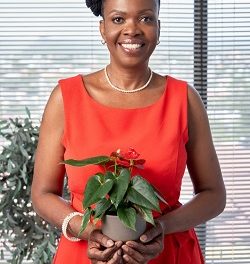
Dalibhunga Madiba

Hidipo Hamutenya welcomes the late Nelson Mandela at Eros Airport on his last state visit to Namibia.
Having just emerged from the ravages of the brutal apartheid system, it was all too easy for South Africa to spiral into violence, pitting black against white. Instead, like the true statesman that he was, Nelson Mandela preached and practised true reconciliation, extending a hand of forgiveness to the very same countrymen who had incarcerated him for 27 years and brutally oppressed his people. Not for this great man the name-calling and the finger-pointing, be it the former oppressors or political opponents. In fact, he appointed IFP President Mangosuthu Buthelezi acting President when he and Thabo Mbeki, then Deputy-President, were out of the country. This gesture effectively neutralised Buthelezi and earned Madiba his everlasting respect. This was an astute political move on Mandela’s part, coming as it did at the height of the so-called black on black violence.
In a singular lack of rancour, he brought blacks and whites together in the united rainbow nation that South Africa is today, even in the face of opposition and criticism of his actions from his own comrades.
A few instances immediately come to mind: when Chris Hani was assassinated in 1993 by a right-wing assassin’s bullet, tensions in the country ran high, the masses were baying for blood; we waited with bated breath for the country to spiral into civil war. Instead, Mandela prevailed upon South Africans for calm and level-headedness, urging them to ‘move forward to what is the only lasting solution for our country – an elected government of the people, by the people and for the people.’ A crisis was averted as South Africans listened.
Another instance that springs to mind is during the 1994 World Cup Rugby tournament, incidentally held in South Africa. Fully aware that rugby had long been a game for whites from which blacks were excluded, Mandela, now the first black President of a new South Africa, wore the green and yellow Springbok rugby jersey to the finals in a show of support that the players themselves credited with winning the coveted Ellis Webb cup in what has since been dubbed ‘the Madiba Magic.’
What is less well known is the fact that when Mandela became President of South Africa, he insisted on retaining white security officers in his personal security detail, much to the consternation of his security detail of former Umkhonto we Sizwe operatives. Such was Madiba, the visionary, the pragmatist, the reconciler: the lesson in humility.
In a continent plagued by dictators running rampant and where elected so-called democratic leaders seek to change the constitutions of their countries to give themselves yet more terms in office, Mandela’s greatest legacy to Africa was his ability to step down after only one term in office. Not that he could not have served another term if he had so wished, but being Mandela, he saw the importance of passing on the mantle of leadership to a younger, more vibrant generation that would bring new ideas to build South Africa. A highly commendable act that alas many of our African leaders have not emulated.
It is all these attributes and more that have made Mandela so beloved of not only his compatriots, but of the world. All we can say is: Hamba Kahle Qhawe la maqhawe!
Farewell and may his soul rest in eternal peace.
Hidipo Hamutenya













































